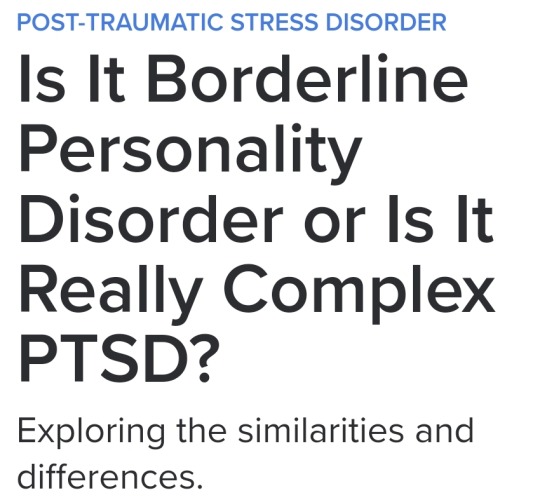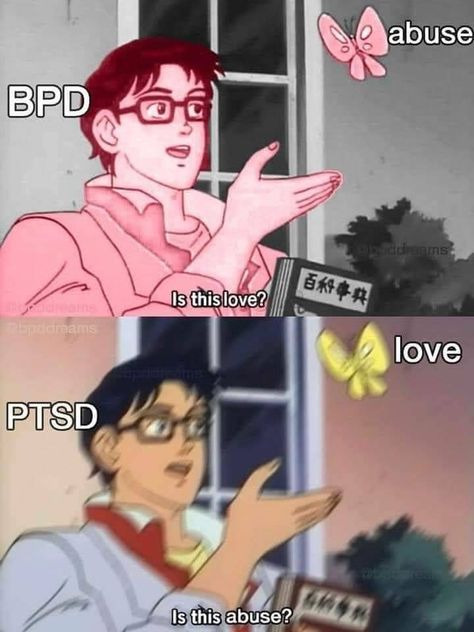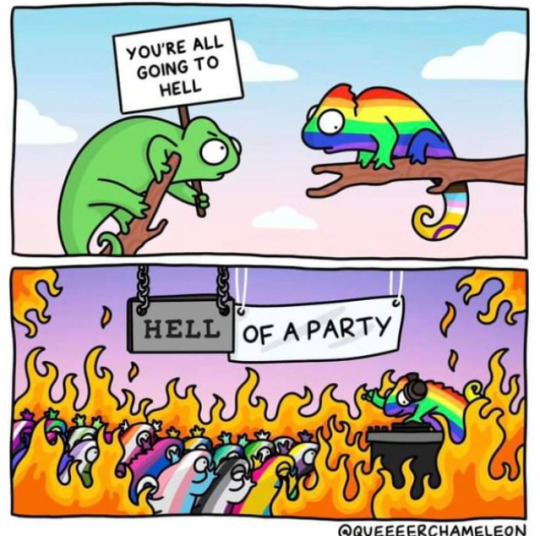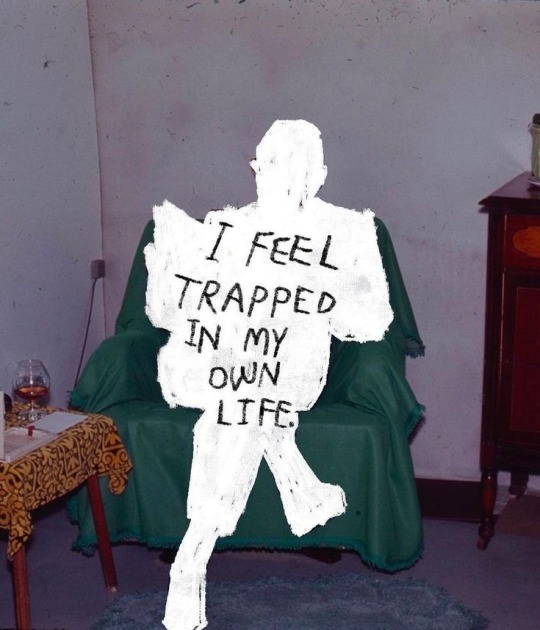Text
Reblog if you're LGBTQIA+ (Yes Trans people and people on the ace/aro spectrum are also valid, shut up)
6K notes
·
View notes
Text
Hey if you’re aspec in any way and you are reading this…
You’re queer as fuckin’ hell and that’s epic, keep doing what you do. Y’all’re valid
4K notes
·
View notes
Text
Bro I love when people get upset with me about making silly jokes about my trauma/mental illnesses and get happier when people join in on the joke like what do you want me to do trauma dump on main???? Not talk about my feelings???? I'd rather people make fun of my trauma than deal with the "oh you sad poor baby oh you poor thing I'm so proud you made it this far you're doing so great" like don't infantilise me make me the butt of every joke about PTSD 😭😭😭😭
#cough cough my roommate#just kidding I love her#but please joke with me#i don't like being the only person who laughs#if i don't laugh i'll cry
8 notes
·
View notes
Text
Reason to Live #10444
One day all this will just be a bad memory 🤞🤞 – Guest Submission
(Please don't add negative comments to these posts.)
190 notes
·
View notes
Text
please, for the love of all things holy, find something like this that helps you ground yourself. The first time I ever had a horrible flashback, my best friend was around and didn't know how to comfort me yet. The only thing that kept me sane during it all was this exact technique right here. Find something that works for you. be strong, my love, nothing lasts forever. Even ghosts die from time to time
Flashbacks are rough. I'm still learning how to deal with them myself. I just want everyone to know it's okay. Crying is normal. Hold your favourite stuffed animal, get comfy under a hundred blankets, or hug your friend. You can get through it.
Here's a gif of the box breathing technique:

13 notes
·
View notes
Text
Beautifully written, OP
Do me a favor, okay? Next time you have a chance, close your eyes for a minute and take a deep breath and imagine someone loving you.
Imagine someone who gets excited just thinking about you. Imagine someone who loves the things you say and do and who genuinely enjoys spending time with you. Imagine someone who feels lucky every moment they get to be around you.
It can be a real person or someone you just made up. You can imagine them praising you or laughing with you or touching you or whatever love means to you. It can be romantic or otherwise. Take your pick.
And if you had a hard time doing it?
Do it again. And again. And again.
I read once that it’s important for us to visualize being loved. That your brain needs to be trained like a muscle, and like a muscle, it can become weak from disuse. Your brain can only do the things that you practice doing, and if you never, ever visualize someone loving you, it becomes difficult to even imagine someone loving you. You get stuck in a rut. And once it’s impossible to imagine someone loving you, it becomes impossible to believe you will ever be loved.
I think… sometimes it can become easy to stop believing that we’re worthy of love. And I think sometimes we have this fantasy of someone making us believe that we’re worthy of it again. Or that somehow we’ll just — earn it, one day. Being worthy of love and desire, respect and affection.
But I think the truth is that we can only start believing that we’re worthy of love if we’re capable of imagining it. And it becomes much, much easier to imagine it if you practice doing so.
It may feel awkward at first. Embarrassing. Silly. Maybe even painful. But think about it like this, maybe: your first day in a dance class, you’ll fall. You’ll look ridiculous. It’ll feel like your body will never be able to do this fluidly. But by the end of the class, you’ll be able to move in a whole new way. Maybe not perfectly, but… better, y’know?
Learn to waltz with your own mind, and try not to cringe too hard at your first awkward movements. Start small and work your way up if you have to. Someone liking you, then someone liking your conversations, then someone liking your presence, then someone purposefully seeking you out. Someone putting time aside for you. Someone thinking about you when you’re not there. Someone being with you because there’s nowhere they’d rather be.
It may feel self-indulgent, but… I mean, we all deserve to be indulged sometimes. And we all deserve to feel worthy of love.
So… indulge yourself. Take a moment and have a silly little fantasy. Get into the habit of imagining love, and imagining it for the you that exists right now, not the you that you wish you were.
Learn to speak the language of love as it applies to you, even if you think that it doesn’t, and one day you’ll realize how to use those syllables to say your own name.
It’ll come one day. In the meantime, let’s learn to dance together, okay?
71 notes
·
View notes
Text
"Delayed triggers" happen. Sometimes, you might not notice your trigger and get triggered later when you do. Brains work in mysterious ways. It's okay. You're not faking or being attention-seeking for it.
-emotion holder
918 notes
·
View notes
Text

panels from Zoe Thorogood’s “It’s Lonely at the Center of the Earth”
5K notes
·
View notes
Text
Had something similar trigger me the other day. I haven't been the same since
People need to understand that for those who have gone through trauma experience things differently.
If you went through an abandonment as a child, a breakup others would get over with in months can take years to overcome.
If you went through domestic abuse, even small changes in a loved one's tone can make you anxious.
If you were belittled your whole childhood, being professionally critized at work can feel like the end of the world.
Trauma effects us for a long time after it occurs.
8K notes
·
View notes
Text
If you’re a domestic violence survivor, I’m proud of you for surviving.
If you’re an SA survivor, I’m proud of you for surviving.
If you’re a CSA survivor, I’m proud of you for surviving.
If you’re an ECSA survivor, I’m proud of you for surviving.
If you’re a child abuse survivor, I’m proud of you for surviving.
If you’re a neglect survivor, I’m proud of you for surviving.
If you’re a war survivor, I’m proud of you for surviving.
If you’re a natural disaster survivor, I’m proud of you for surviving.
If you’re a gun violence survivor, I’m proud of you for surviving.
If you’re a cult survivor, I’m proud of you for surviving.
If you’re an organized abuse survivor, I’m proud of you for surviving.
If you’re a torture survivor, I’m proud of you for surviving.
If you’re a TTI survivor, I’m proud of you for surviving.
If you’re a physical abuse survivor, I’m proud of you for surviving.
If you’re a mental abuse survivor, I’m proud of you for surviving.
If you’re a survivor, I’m proud of you for surviving.
1K notes
·
View notes
Text
How to make life feel worth living when you have crippling anxiety and PTSD no borax no glue
18 notes
·
View notes
Text
“If you don’t address your childhood trauma, your romantic relationships will.”
264 notes
·
View notes
Text
This is part of my research right now, very good article. This part has always fascinated me, especially as someone with cptsd and who has a best friend that has bpd (I'm fairly certain they do, anyway)
Verified by Psychology Today
Annie Tanasugarn Ph.D., CCTSA
Understanding PTSD

Borderline personality disorder (BPD) is a pervasive and lifelong mental disorder that affects interpersonal relationships, mood, and behavior. Those diagnosed with BPD often struggle with an unstable self-identity and self-image, difficulty in regulating their emotions, impulsive and self-sabotaging behavior, a fear of abandonment, feelings of emptiness, and a pattern of highly unstable relationships where idealization and devaluation are common.
Although those who develop BPD may have a history of child abuse or neglect, the causes of BPD are often not fully understood. However, some research suggests links to genetics with a family history or a biological predisposition to the disorder, while other research supports an environmental link.
Complex PTSD, or cPTSD, is a subset of PTSD. Whereas PTSD is a fear-based disorder, cPTSD is often referred to as a shame-based disorder originating from a history of chronic, and long-term exposure to traumatic events such as ongoing severe child abuse or long-term relationship abuse.
Those who have experienced repeated trauma at a young age and/or where escape from the situation was not possible are at a greater risk for developing cPTSD, such as children who cannot escape their home environment. Symptoms include flashbacks of the events, fear, despair, shame, chronic devaluation of self, terror, and avoidance of socialization or relationships. Unfortunately, those who have experienced severe ongoing trauma in childhood are at an increased risk for being re-traumatized in adulthood—especially in romantic relationships—thus increasing their risk of developing cPTSD or a worsening of existing symptoms.
Similarities Between BPD and cPTSD
BPD and cPTSD often get confused because of their similar and often overlapping behavior and affective patterns. Both often come with significant overall emotional distress and/or emotional “triggers,” suicidal thoughts, dissociation, flashbacks, anxiety, and depression. Even with sophisticated diagnostic criteria, there are behavioral and affective overlaps between the two disorders which can complicate whether symptoms are exclusive to one disorder or a combination of the two.
Additionally, both diagnoses struggle with issues of negative self-concept, difficulties in regulating their emotions—including outbursts of crying or rage—and significant interpersonal relationship issues. Both BPD and cPTSD may be dually diagnosed in a person where symptoms can range from high to low in one, or both disorders.
Key Differences Between BPD and cPTSD
▪︎While both disorders may experience symptoms associated with fear within relationships, one distinguishing factor seen in BPD that is not often seen in cPTSD is a fear of abandonment. Those with cPTSD, however, may avoid relationships based on feeling somehow unlovable or undeserving because of the abuse they endured, which can overlap with similar feelings experienced in BPD. Similarly, those with cPTSD often avoid relationships altogether or push others away as unsafe or threatening; these behaviors may be confused as a fear of abandonment seen in those with BPD.
▪︎Those with cPTSD may often feel shame and blame themselves for their interpersonal problems—a symptom that is also similar to the experiences of those with BPD. However, another key difference is that those with cPTSD usually do not self-harm; this is a more common behavior seen in BPD, where stressors in interpersonal relationships may trigger episodes of self-harming behavior. This may include suicidal ideation or a suicide attempt.
▪︎Another key difference between the two is that whereas both may feel relationships are seen as unsafe or threatening, a person with cPTSD may often choose to avoid intimacy or relationships altogether. A person with BPD, on the other hand, may struggle with being alone and may use relationships to prevent feelings of loneliness or abandonment.
▪︎While both those with BPD and cPTSD struggle with emotional regulation and often experience outbursts of anger or crying, those with cPTSD may experience emotional numbing, emptiness, or detachment from emotions.
▪︎Additionally, while both those with cPTSD and BPD can struggle with a solid self-concept, those with BPD often struggle with an understanding of who they are at their core. They may change their interests or hobbies depending on who they associate with because of a limited sense of self-identity. On the other hand, those with cPTSD have an understanding and awareness of who they are and have a more stable self-identity. However, they struggle with feeling "damaged" or deserving of the pain they’ve suffered and carry misbeliefs about themselves as unworthy of love or undeserving of happiness. These experiences impact relationships, which may be confused as a problem with self-identity or self-awareness.
▪︎Lastly, while both those with BPD and cPTSD often struggle with traumatic pasts, with successful treatment those with cPTSD may experience less emotional reactions or behavioral disruptions over time by engaging in calming strategies or redirecting their energy away from an emotional stressor to reduce symptoms associated with panic attacks.
#cptsd#complex post traumatic stress disorder#childhood ptsd#trauma response#borderline pd#bpd#awareness#psychology#good post op#long post#everyone needs to read this
3 notes
·
View notes
Text
Kids Aren't Mature For Their Age
Warning- I discuss child sexual exploitation in this article, nothing too detailed, but viewer discretion is still being advised.
I was constantly told I was “mature for my age” as a child. That mentality got me into some dangerous situations online. It also nearly got me in trouble while dating in high school.
Telling kids they are “mature for their age” is dangerous. It gives people a sense of pride or accomplishment, but it can warp into a deadly beast. They might start thinking they are “above” their peers because of being “mature for their age”. They might think they can start hanging out with older people because “they are mature for their age”. They might think they can date people 10+ years older than them because “they are mature for their age and therefore impressive to these older people”. At its mildest, it’s a purely innocent compliment. At its worst? It’s a common phrase used to groom pre-teens and teenagers into sexually explicit relationships with older people (online and in-person alike).
Sexual exploitation of children (teenagers and younger) by older people (20s+) is an epidemic. It commonly happens online, but it can also easily happen in person as well. In-person, if a person is subjected to sexual contact, it is often by a family member or another person the child knows well. Online, especially on very poorly moderated websites, it is easy for a child to end up in an explicit relationship (“romantic” and/or sexual) with someone who is ten years older than them (or more).
I was a victim of it. Looking back it was easily a “cyber lolita” situation of sorts. Just about everyone I dated as a teenager was 10+ years older than me and was purely an online relationship. Me being young and dumb (and of course not telling my parents about it), I ended up in relationships and situations that as an adult now, I really regret. For some people, it causes PTSD and CPTSD type problems (post traumatic stress disorder or complex post traumatic stress disorder). For others, panic attacks and other lifelong mental health issues.
Parents and guardians, I am begging you to actively be involved with your kid’s online life. If you’re a teenager or younger reading my article, I am begging you to run the Hell away from any person online in their 20s (or older) trying to date you or have sexually explicit activities with you online (written, webcam/video, pictures, etc.). There is a reason those adults aren’t dating other adults their age. There needs to be an open relationship between parents/guardians and their kids where the parent won’t harshly judge the child and where the kids aren’t afraid to come to their family about this kind of relationship.
These people are pedophiles, point-blank. We need to treat them as such, regardless of who the perpetrator is. If you need resources relating to child sexual exploitation, the following links are good links to utilize!
RAINN - Rape, Abuse & Incest National Network (https://www.rainn.org/)
MaMaMax — https://www.youtube.com/c/MamaMax (makes youtube videos documenting child predators found online as well as documenting websites that have a lot of child predators on them)
NSPCC — https://www.nspcc.org.uk/about-us/ (UK institute dedicated to helping eradicate child sexual abuse)
FBI — https://www.fbi.gov/investigate/violent-crime/cac (Report online predators via FBI)
#cptsdsupport#complex post traumatic stress disorder#signal boost#everyone needs to read this#good post op
6 notes
·
View notes


